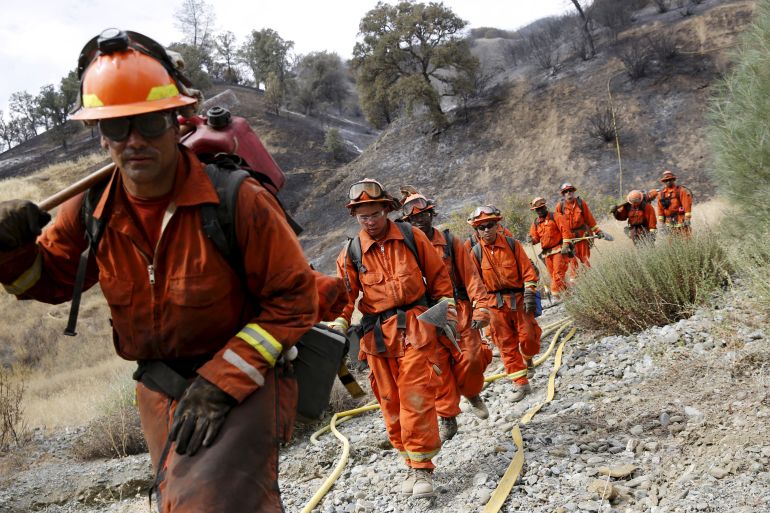‘Coercive and arbitrary’: New report details US prison labour
Imprisoned workers face disciplinary actions if they won’t perform tasks, ACLU finds, and often receive little or no pay.

Los Angeles, California, US – Prison labour in the United States creates $11bn in goods and services annually, a new study has found, but imprisoned workers perform vital services for low wages and with few safety guarantees.
In a nearly 150-page report released in mid-June, the American Civil Liberties Union (ACLU) and the University of Chicago’s Global Human Rights Clinic said nearly 800,000 of the 1.2 million Americans imprisoned in state and federal prisons perform labour during their time behind bars.
Keep reading
list of 3 itemsThe woman confronting the US prison-to-deportation pipeline
California moves to dismantle US’s largest death row
The work of prison labourers – who, the report found, often work for as little as 13 to 52 cents per hour, and in certain states, do not get paid at all – has become the subject of debate over the legacy of racism in the American prison system.
“In addition to working under coercive and arbitrary conditions, incarcerated workers in U.S. prisons are often working for paltry wages or no wages at all,” the ACLU found.
The report, which relied on public records, questionnaires, and interviews with imprisoned people, found that more than 75 percent of respondents faced disciplinary action if they refused to perform certain tasks.
“These punishments can include the loss of visitation rights for loved ones and even solitary confinement,” Jennifer Turner, the report’s lead author and researcher with the ACLU, told Al Jazeera in a phone interview.
“One formerly incarcerated person told us he was held in solitary confinement because he refused to pick cotton for a facility that was built on a former slave plantation.”
The report found that more than 80 percent of imprisoned labourers perform essential tasks for the facilities that imprison them, from janitorial duties to cooking, laundry and maintenance work.
The pay for such work is typically 13 to 52 cents an hour, and in seven states — Alabama, Arkansas, Florida, Georgia, Mississippi, South Carolina, and Texas — the majority of workers receive no pay at all, the report said.
In many states, wages have remained frozen for decades. In Vermont, the report noted, the pay for imprisoned workers was last revised in 1988, and is still set at 25 cents an hour.
“Incarcerated people not only replace workers needed for typically lower-paid maintenance work,” the report said. “But they also perform work that is typically well remunerated, saving prisons even more money.”
The report also noted that nearly 15 percent of imprisoned workers perform jobs for state-owned prison industries or public works, performing a variety of tasks that can include road work, auto maintenance, data entry, call centre work, and even firefighting.
Such work pays more than other prison labour, making between 30 cents and $1.30 a day, still substantially less than a free person makes.
In Oregon, the report noted, an imprisoned person doing work for the Department of Motor Vehicles (DMV) that would typically get $80 a day is paid between $4 and $6, and in Louisiana, imprisoned people make mattresses for 20 cents an hour.
Less than 1 percent of US prison labour is carried out for private industries, with the primary beneficiaries being local, state, and federal governments, the report said.
The US Bureau of Prisons (BOP), which oversees federal prisons, told Al Jazeera in an emailed statement that the humane treatment of those in their custody is a “top priority”.
Work programmes “reduce inmate idleness, while allowing the inmate to improve and/or develop useful job skills, work habits, and experiences that will assist in post-release employment”, the department said.
However, the study found that 70 percent of imprisoned workers said they received no formal job training.
Meanwhile, what little wages they do make are often eaten away by fees charged by prisons for everything from soap to food, to phone calls. Healthcare can also be prohibitively expensive for those behind bars, especially when paired with jobs that pay less than a dollar an hour.
The Prison Policy Initiative, a progressive criminal justice think-tank, said in February that for imprisoned workers who make between 14 and 63 cents an hour, a health fee of $2 to $5 is the equivalent of a $200 to $500 medical visit for someone who is not in prison.
“It is not unusual for more than 60 percent of an incarcerated person’s paycheck to be garnered by these fees,” said Turner. “Often, families that are already missing the income the person would be providing because they’re incarcerated end up helping pay, and go into debt.”